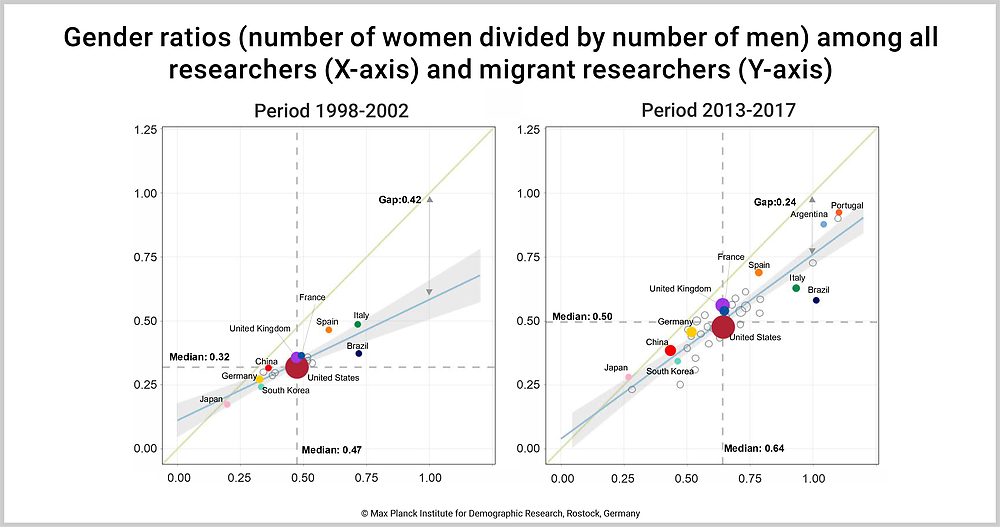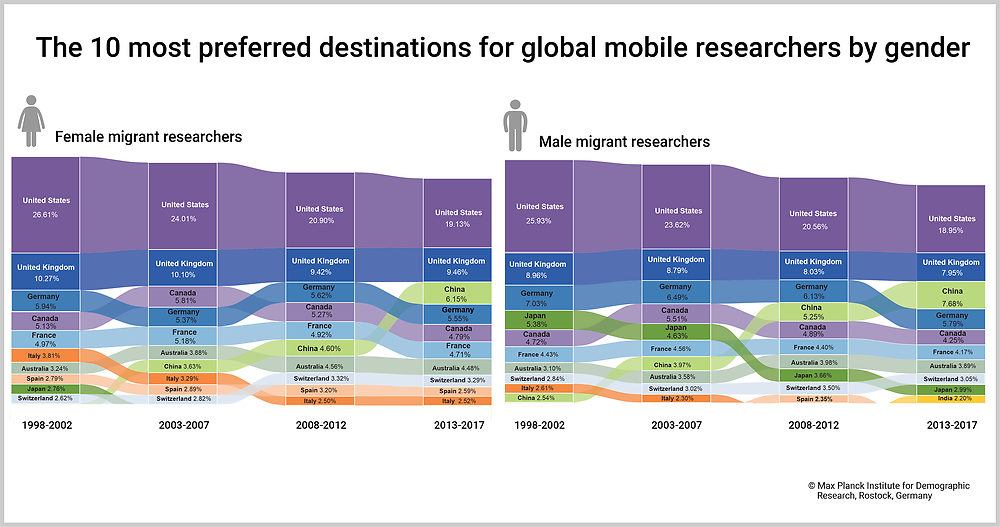February 28, 2023 | Press Release
Migration of Academics Worldwide: Women in Science Are Less Mobile but the Gender Gap has Shrunk

© iStockphoto.com/Alexandr Lukin
An international team including MPIDR Researchers is the first to offer a global and dynamic view on the migration of academics by gender. The paper recently published in PNAS finds that while female researchers were less internationally mobile than men, the gender gap has shrunk considerably over the past 20 years.
Researchers tend to move from one country to another as one of the possible strategies to become internationally recognized and advance their careers. However, is this movement equal for women and men?
Whilst current literature points to gender inequality in science across countries, a lack of relevant data on the migration of researchers has made it difficult to answer whether male and female scientists migrate equally.
Researchers from the Max Planck Institute for Demographic Research (MPIDR) in Rostock, Germany and Oxford’s Leverhulme Centre for Demographic Science are the first to offer a global and dynamic view on the migration of academics by gender.
To achieve this, they used bibliometric data on over 33 million scientific publications from Scopus, a global database of scientific publications, to estimate the international migration of female and male researchers around the world from 1998 to 2017. This allowed the researchers to document and analyze cross-national trends in a systematic way.

© MPIDR
Download Figure (PNG File, 989 kB)
The study found that while female researchers were less internationally mobile than men, the gender gap has shrunk considerably – and decreased at a faster pace than the overall gender gap among researchers.
Co-author Aliakbar Akbaritabar from the MPIDR adds ‘these are positive outcomes to see a cluster of countries undergoing a transformation where the gender gap is closing. Still, there is a long way to go until male and female researchers in the global science network in general and the migration of scientists specifically have equal opportunities, resources and outcomes.’
Despite these improvements, female researchers continue to be under-represented among internationally mobile researchers. In addition to moving less, female researchers also originate from and move to less countries, as well as migrate shorter distances, than their male counterparts.
Gender gaps smaller in high-income and upper-middle income countries
Lead author Xinyi Zhao, from the MPIDR and Oxford’s Leverhulme Centre for Demographic Science adds, ‘While gender inequalities remain, our findings support a growing number of female academics migrating internationally. However, female researchers are still restricted in moving globally as freely as their male counterparts.’
Gender gaps among researchers and international scholars favoring men were smaller in high-income and upper-middle income countries, than in low-income countries. The US, UK, and Germany remained popular with female and male mobile scholars, but in these global hubs of international science, gender gaps nonetheless persisted.
In a handful of countries like Portugal, Brazil and Argentina, near gender equality among mobile researchers was seen. Others such as Japan and South Korea had significant gender gaps in favor of men.
China’s relevance as destination for researchers is growing
The paper adds, ‘While the US remained the leading academic destination worldwide, the shares of both female and male scholarly inflows to that country declined from around 25% to 20% over the study period, partially due to the growing relevance of China.’

© MPIDR
Download Figure (PNG File, 576 kB)
Co-author Emilio Zagheni from the MPIDR adds ‘Our study indicates that opportunities for women to advance their academic careers through international mobility have increased. While we unveiled a key and welcome trend, we also note that more research is needed to understand underlying mechanisms, including the roles played by families and by science policies in shaping gender differences in the drivers and outcomes of relocations.’
This text is a slightly changed version of a text originally published by the Leverhulme Centre for Demographic Science, Department of Sociology and Nuffield College, University of Oxford. It can be found here.
Original Publication
Zhao, X., Akbaritabar, A., Kashyap, R., Zagheni, E.: A gender perspective on the global migration of scholars. PNAS (2023). DOI: 10.1073/pnas.2214664120
Authors and Affiliations
Xinyi Zhao, Max Planck Institute for Demographic Research, Rostock; Leverhulme Centre for Demographic Science, Department of Sociology, University of Oxford
Aliakbar Akbaritabar, Max Planck Institute for Demographic Research, Rostock
Ridhi Kashyap, Leverhulme Centre for Demographic Science, Department of Sociology, University of Oxford; Nuffield College, University of Oxford
Emilio Zagheni, Max Planck Institute for Demographic Research, Rostock